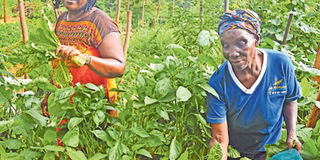Women get goodies from sack farming

Members of the group harvest vegetables that they cultivate in their sack farms. To make sack farms, the women dig up soil, refine it by sieving, add manure to it and thoroughly mix it. PHOTO | CAROLINE WAMBUI | NMG
What you need to know:
- Gaciongo is an example of the proverbial king who is never respected at home.
- The women, mostly aged 60 and above, say they felt their energy was wearing away as they could barely till land in the semi-arid region.
- To make sack farms, the women dig up soil, refine it by sieving, add manure to it and thoroughly mix it.
- The women mill fortified flour that is rich in nutrients.
The blazing sun welcomes us to Gaciongo village in Marimanti Location, Tharaka-Nithi County.
Farming in this area is difficult as sun “cooks up” vegetation though acacia and baobab thrive.
Gaciongo is an example of the proverbial king who is never respected at home.
Members of Tharaka Green Gold group have made a mark in and outside Africa through their unique products but little is known about them in Kenya and their county.
The group grows vegetables in sacks, practices basketry and makes jewellery using local material.
The women, mostly aged 60 and above, say they felt their energy was wearing away as they could barely till land in the semi-arid region. Sack farming was a welcome relief.
“The initial cost was low and the sacks could be carried from one place to another. This this ensured a stable supply of vegetables in our homes. The excess was harvested, solar dried, preserved and sold on order,” said Esther Mbaabu, a member of the group.
“The vegetables have a shelf life of up to a year.”
To make sack farms, the women dig up soil, refine it by sieving, add manure to it and thoroughly mix it.
An empty sack, a used mosquito net or cement bags is laid on the ground and a can filled with pebbles, grass or twigs placed in the centre.
NATURALLY AVAILABLE RESOURCES
Soil is then filled around the can. The can is pulled up, letting the pebbles settle at the centre. The process is repeated till the sack is full.
After planting, the pebbles act as the watering system for the bag as the water poured in slowly filters through gradually reaching the vegetables.
The group reuses and recycles laundry and kitchen water.
The women mill fortified flour that is rich in nutrients.
The group also practices basketry. A basket can be sold for Sh3,500. The women have exhibited their products in Lira, Hoima and Kisoro in Uganda.
Some of the women’s products were identified as exports and featured in Birmingham, the United Kingdom Springs Exhibition early in February.
“We train mothers who go to households to demonstrate cooking especially using the varieties of flour we make,” Ms Martha Kagondu, another member, says.
The women further utilise the naturally available resources like the Baobab and Tamarind fruits in making juices which they pack and sell and still use them in food preservation like meat.





